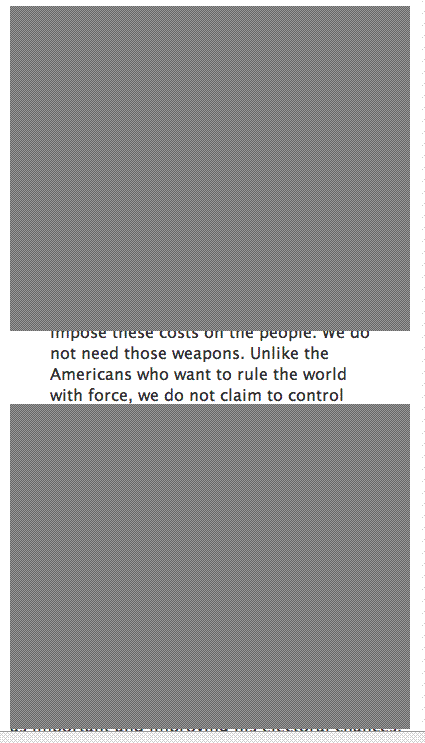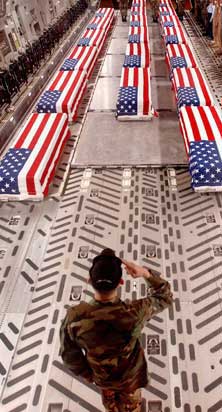The USG Open Source Center translates Iraqi television reactions to the fifth anniversary of the US invasion of Iraq
Iraqi TV Channels Carry Reactions to Fifth War Anniversary
Iraq -- OSC Summary
Thursday, March 20, 2008 . . .
Al-Rafidayn [Sunni fundamentalist, affiliated with the Association of Muslim Scholars]

Harith al-Dari
Within its 0700 GMT newscast, the [Rafidayn] channel carries the following announcer-read report: "Harith al-Dari, secretary general of the Association of Muslim Scholars, said that Iraq has become an arena for conflicts among foreign forces. He added that Iraq's people and civilization are facing a war of elimination that seeks to wipe out their identity. Addressing the conference of the Higher Council for Islamic Affairs, Al-Dari said that the Iraqi issue is not being handled in a satisfactory manner by the Arab countries and the international community. He went on to say: After five years of the invasion, the country is facing a grievous security crisis. In fact, there is no security at the political, health, and economic levels."
At 0807 GMT, the channel carries an episode of its "Political Dialogue," moderated by Imad al-Dulaymi. The program, which discusses the fifth anniversary of the war on Iraq, hosts Ayatollah Husayn al-Mu'ayyad, head of the Iraqi National Trend.
Al-Mu'ayyad says: "There is no doubt that the occupation committed the most appalling form of humiliation against the Iraqis. Eliminating Iraqi sovereignty and bringing the country under heinous military occupation is, by all means, a humiliation of the Iraqi national pride. The launch of a political process away from the will of the Iraqi people and the suppression of the Iraqi national scheme are nothing but a stab in the heart of each Iraqi citizen. The outrageous violation by the occupation of human rights at Abu-Ghurayb is another attempt to humiliate the Iraqi people."
He adds: "The United States wants to control oil sources, rather than exports. The United States views oil as a treasure upon which it has to lay its hand. Therefore, it is not enough for them to ensure that oil will be exported to them. They want to control oil and use it as a means to control international politics and to exert pressures even on Europe. This is what the new world order is all about."
Asked to assess the current security situation, he says: "Since the start of the security plan, I have repeatedly said that this plan is a failure. Security cannot be restored through the imposition of martial law. No one can say there are security successes if the streets are full of policemen and soldiers. This is not a professional way to keep security in any country. Security should be maintained while the army is in its barracks and the police are in their stations. There has to be a security umbrella that covers the whole country. A citizen has to feel that security is based on objective justifications and principles, rather than on dividing the same city into cantons; turning shops into jails; and filling streets with tanks, armored vehicles, and armed men. This is not the way to keep security. On the contrary, this indicates lack of security and lack of security guarantees."
Baghdad Channel [affiliated with the Sunni fundamentalist Iraqi Islamic Party of Iraqi Vice President Tariq al-Hashimi] :

Iraqi VP Tariq al-Hashimi
Within its 1800 GMT newscast, the channel carries the following announcer-read report over video: "A large-scale political frustration now dominates the US stances at the logistic, field, local, and international levels. In addition, it has become evident that many of the circumstances preceding and engulfing the invasion of Iraq in 2003 are groundless. It has also become clear that most of the justifications to launch that war -- particularly the alleged wish to eliminate weapons of mass destruction that Iraq was claimed to have possessed then, were unrealistic and invalid."
The channel then carries field interviews with some Iraqi citizens.
An unidentified citizen says: "We were hoping that the new situation will be different. We thought a dramatic change would happen. But things are becoming worse. Every side is after its own interests. A certain side wants to defend itself, while another one wants to defend its party. The simple citizens are left alone to face the horrible smell of the sewage system. Sewage water overflows almost every day. Our children's health is deteriorating because of various disea ses. Potable water is another story to tell."
Another citizen says: "It is five years of destruction and deterioration. Things are becoming worse and worse. Nothing has improved. What improvement is there? Some appear on TV and claim that security is there. But these are just empty words. Security is limited to one small spot in Iraq; namely, the Green Zone."
The channel then carries the following announcer-read report over video: "Dozens of Iraqis gathered in Al-Firdaus Square in central Baghdad, demanding the occupation troops to leave their country. Today's scene is totally different from the scene which this very square saw five years ago. The Iraqis still vividly remember the sounds of powerful blasts, the smell of gunpowder, and the shrieking of planes. They cannot forget those scenes, which enroot in one's memory the images of death, damage, chaos, unemployment, and a series of disasters represented in storming houses, arrests, and indiscriminate killings. Such acts soon dominated the scene and eclipsed the alleged democracy, security, prosperity, and peace. The occupation has, indeed, left a dark era that unveiled the falsehood of the allegations and lies that were fabricated at the Pentagon's decision-making circles."
Within the same cast, the channel carries a live interview over telephone with Sa'd al-Hudaythi, a political analyst, to comment on US President George Bush's speech on the fifth anniversary of the war on Iraq.
Al-Hudaythi says: "The US rhetoric has been the same since the first day of the invasion. In my view, it is not to the interest of the US Administration to abandon this rhetoric at this phase, particularly given the fact that the US elections are approaching."
"Five years have passed since the start of the US occupation. We have had a mixture of hopes and pains. An assessment of the first two years of the occupation shows that hopes were greater than pains. But in the third and fourth years, pains overruled hopes. However, there has been a relative change over the past few months. We hope that this change will be for the better and will be sustained. Of course, this depends on many requirements which the Iraqi political forces have to fulfill. In addition, let us not forget that there is a negative regional influence over the stability of Iraq," he adds.
Al-Furat [affiliated with the Shiite fundamentalist Islamic Supreme Council of Iraq headed by Abdul Aziz al-Hakim, who is close both to Bush and to the ayatollahs in Iran.]

Abdul Aziz al-Hakim
Within its 1700 GMT newscast, the [Furat] channel carries the following announcer-read report: "On the fifth anniversary of the war on Iraq, the Iraqis said that the reckless practices of the toppled regime against the Iraqi people and the neighboring countries are the main factor leading to the war in the region. The Iraqis went on to say that they are no safer now after the fall of the horrible dictatorship. They added that democracy is the best means to replace the ousted regime."
The channel then carries field interviews with a number of Iraqi citizens.
A citizen says: "If it were not for the Multinational Force, Saddam and even his grandsons would be still ruling us. This is a positive point. But there are some disadvantages now. The Iraqis were suppressed and were done injustice, so they were waiting for any one to save them. What else could they have done?"
Kazim Jasim says: "A war would end and another would start. With a war against Kuwait and another against Iran, the people got exhausted. What did he (Saddam Husayn) think he was doing? The people were powerless. Saddam Husayn is to blame for the current incidents. The people have to show patience. But we are too tired. Saddam had been suppressing us for 35 years."
Jalal Hashim says: "He will not return. The dead do not come back. His regime will not return either. The Ba'thists will never be back. The people are now aware of their real face, means, and purposes."
Another citizen says: "No one wants dictatorship. We want good people from our country to work for the interest of the country and the youth and to address the current situation."
Another citizen says: "The US troops used Saddam Husayn as a pretext to enter Iraq. It is true that there is no security now. But it is also true that you can wander around in a climate of freedom and democracy."
Al-Fayha [Independent, broadcast from Sulaymaniya, a Kurdish city in the north run by the Patriotic Union of Kurdistan headed by Kurdish Iraqi President Jalal Talabani]
Within its 1900 GMT newscast, the channel carries the following announcer-read report: "Under a young democratic system, the Iraqis mark the anniversary of the fall of the idol. The decent Iraqis have agreed to sustain this system, turn their backs on the appalling past, and go ahead with the building up of the unified Iraq. On the fifth anniversary of the start of Iraq's freedom operations -- which toppled Saddam's dictatorial regime -- one cannot help recalling the unforgettable events."
The channel then carries the following announcer-read report over video: 'The war began and the Iraqis started to live moments of suspense. They could not believe the news that the blind suppression would end. The Multinational Force used smart bombs to target the buildings which Saddam's regime used for suspicious activities. From the very first moment, the bombing brought an end to the fascist Ba'th Party's ambitions to remain in power."
The channel then carries field interviews with Iraqi politicians to comment on the anniversary.
An unidentified representative of the Iraq Communist Party says: "Our vision called for the fall of the regime. But we did not want it to be this way. We and some other forces were hoping to gather the forces of our people. We pinned hopes on the army, the national forces, and decent officers, as well as on the unity of Iraqi opposition and decent political, international, and media support. This was our vision. We wanted to gather all those forces to get rid of the regime. We had already realized that foreign interferences would lead to certain consequences."
In another interview, an unidentified citizen says: "When the military operations to depose the regime in Iraq started, we felt optimistic. Our dreams were different from what is happening now. We expected things would be better. We thought that the freedom of the Iraqis would improve, especially after the injustice and suppression we had put up with."
. . . This summary highlights select Iraqi TV reporting on the fifth anniversary of the war on Iraq. It covers reports carried on 19 March by: -- Cairo Al-Rafidayn Satellite Channel in Arabic -- Pro-Sunni, anti-US Iraqi channel believed to be affiliated with the Association of Muslim Scholars -- -- Baghdad Baghdad Satellite Television in Arabic -- television channel believed to be sponsored by the Iraqi Islamic Party -- -- Baghdad Al-Furat Television Channel in Arabic -- Television channel affiliated with the Supreme Council for the Islamic Revolution in Iraq (SCIRI) led by Abd-al-Aziz al-Hakim -- -- Al-Sulaymaniyah Al-Fayha Television in Arabic -- A private, independent satellite channel that addresses Iraq-related issues, supervised by Muhammad al-Ta'i, an Iraqi media figure . . .
Labels: Iraq
For "cont'd" postings, click here.














 |
|
 Facebook
Facebook




